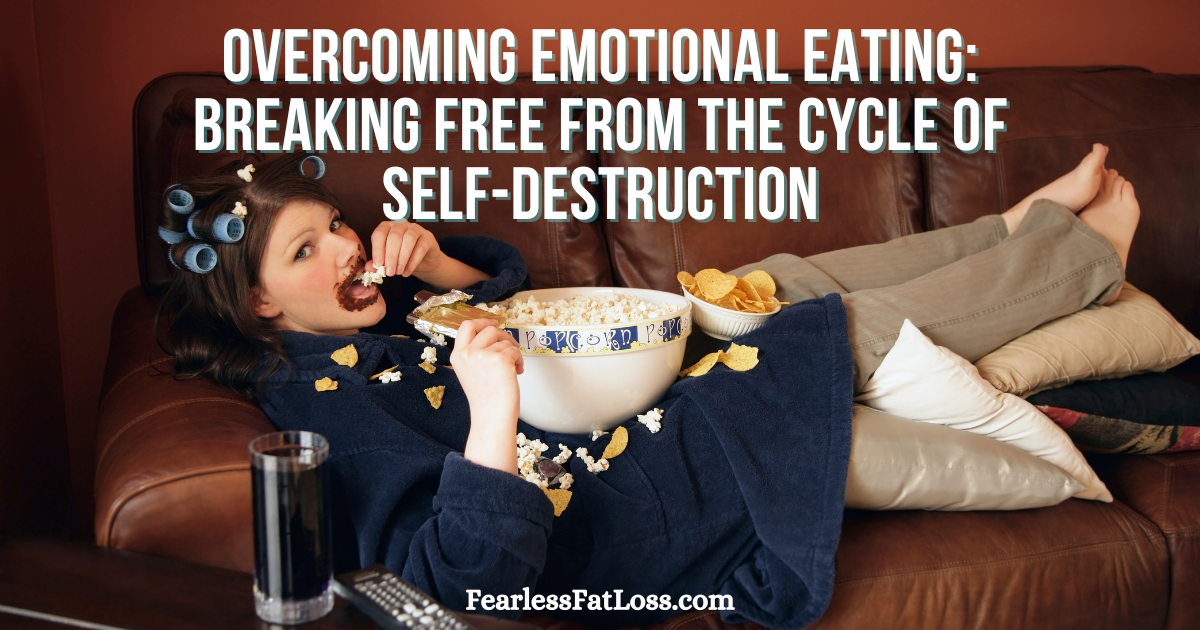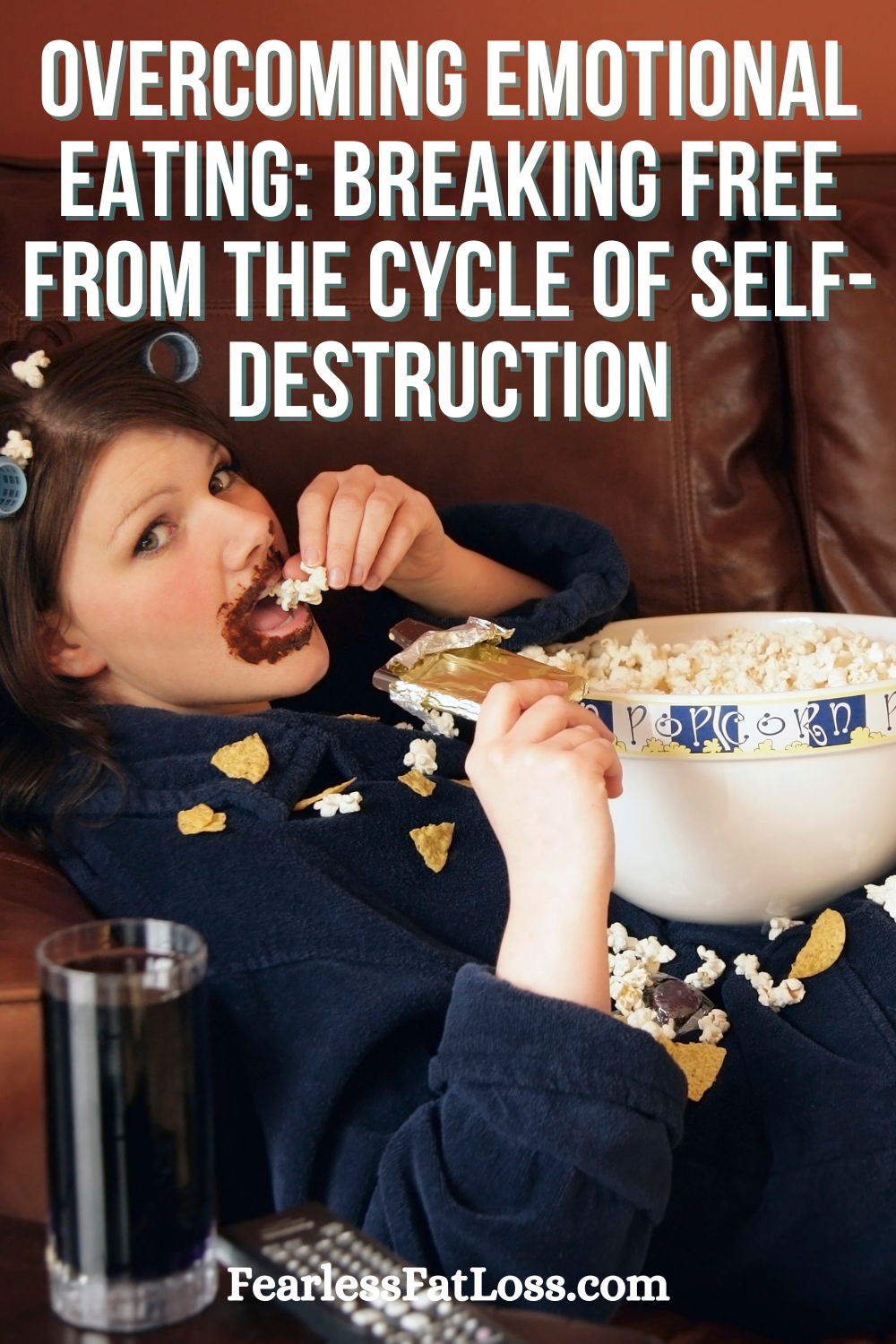Overcoming Emotional Eating: Breaking Free from the Cycle of Self-Destruction
As a professional mind-body weight loss coach since 2009, I’ve worked with numerous smart women who struggled with emotional eating to help them break free from the cycle of self-destruction with their unhealthy eating behaviors.
This insidious, unhealthy eating behavior can lead to feelings of guilt, shame, and self-loathing, making it even more challenging to achieve our weight loss goals. However, I’m here to tell you that there is hope. With the right strategies and mindset shifts (Note: Mindset is 92.8% of the issue), you can break free from the cycle of emotional eating and develop a healthier relationship with food.
You can overcome emotional eating and break free, but not with mainstream food diets. There’s more to it than that.
Before we get into a few tips I want to share with you for overcoming emotional eating, let’s cover a few basics about emotional eating.
Emotional Eating 101
Let’s be very clear: Eating Food Is GOOD, but there are some basics that are very important to address.
If you eat healthy food in balance, using portion control and planning, and you eat only when physically hungry, this is great! The human body needs food for fuel!
Ok, that part is excellent, but what I just outlined is not emotional eating, which is the problem this article is all about when we’re looking at overcoming emotional eating.
Emotional eating is not about physical hunger, emotional eating is about eating for other reasons besides physical hunger.
This right here is the biggest problem because guess what happens when you eat food and your body is not physically hungry? Yep! You end up gaining more weight simply because you body stores that food as extra energy in the form of fat.
Overcoming Emotional Eating: Breaking Free from the Cycle of Self-Destruction
This is the simplest breakdown of the difference between necessary and required eating and emotional eating. Other problems many smart, successful women have…. which frustrates them even more so since they have this one area of their life they are not achieving success with….is using food as a coping mechanism for stress, anxiety, boredom, or other emotions. While it may provide temporary relief, it ultimately leads to a vicious cycle of overeating, guilt, and self-blame.
It’s essential to recognize that emotional eating is not about willpower or discipline, which is why typical diets don’t fix it; instead it’s about understanding the underlying emotional triggers and learning healthier ways to manage them.
Next, let’s take a look at some things that can drive emotional eating, its impact on our physical and mental health, and most importantly, three actionable tips to help awesome, smart women overcome emotional eating.
3 Common Drivers Behind Emotional Eating
1. Stress and Anxiety: In today’s fast-paced world, stress and anxiety are ubiquitous. When we’re feeling overwhelmed, our bodies release cortisol, a hormone that stimulates the appetite centers in our brain. This can lead to cravings for comfort foods that are high in sugar, salt, and unhealthy fats.
2. Low Self-Esteem: Negative self-talk and low self-esteem can trigger emotional eating. When we feel inadequate or unworthy, we may turn to food as a way to validate ourselves or seek confidence and comfort through food with a mood boost from addictive ingredients in processed food.
3. Trauma and Attachment Issues: For some individuals, emotional eating may be linked to past traumas or attachment issues. This can manifest as a deep-seated fear of abandonment or rejection, leading to overeating as a way to cope with feelings of insecurity.
The Impact of Emotional Eating on Our Health
Emotional eating can have severe consequences on our physical and mental well-being. Some of the risks associated with emotional eating range from the most obvious (overweight or obesity) to health issues many don’t think about daily, unless they are living with them now (like IBS). Here’s a short list:
* Weight gain and obesity
* Insulin resistance and type 2 diabetes
* High blood pressure and cardiovascular disease
* Digestive problems, such as bloating and irritable bowel syndrome (IBS)
* Mental health concerns, like depression, anxiety, and low self-esteem
Three Tips to Help Women Overcome Emotional Eating
If you’d like to immediately start overcoming emotional eating then here are my top 3 tips to help you out. You can take action right now so that you can create change in your life but keep in mind, it’s going to take time with continued consistent, repetition of new, healthy behaviors to heal emotional eating.
My mind-body weight loss coaching clients heal their eating pretty quickly but that’s because they have my help, support, accountability and proven system. Don’t expect that when trying to overcome emotional eating on your own that it will be fast but if you stick with it over time you can be in your driver’s seat to see your results.
Tip #1: Practice Mindful Eating
Mindful eating involves paying attention to your physical sensations, emotions, and thoughts while eating. This helps you tune into your body’s hunger and fullness cues, reducing the likelihood of overeating or using food as a coping mechanism. To practice mindful eating:
* Eat slowly and savor each bite
* Pay attention to the flavors, textures, and aromas of your food
* Stop eating when you feel satisfied, rather than stuffed
* Keep a food diary to track your eating habits and identify patterns
Tip #2: Identify and Challenge Your Emotional Triggers
Understanding your emotional triggers is crucial to breaking the cycle of emotional eating. Take time to reflect on why you eat when you’re stressed, anxious, or bored. Ask yourself:
* What am I trying to accomplish by eating?
* Is there another way to manage my emotions, such as exercise, meditation, or talking to a friend?
* Can I find alternative coping mechanisms, like journaling or creative pursuits?
Tip #3: Develop a Self-Care Routine
Self-care is essential for managing emotional eating. By prioritizing activities that nourish your mind, body, and soul, you’ll reduce your reliance on food as a coping mechanism. Consider incorporating the following self-care practices into your daily routine:
* Exercise regularly, such as yoga, walking, or swimming
* Practice gratitude by writing in a journal or sharing three things you appreciate with a friend
* Connect with nature through gardening, hiking, or simply spending time outdoors
* Engage in creative activities, like painting, drawing, or playing music
Who Wants the Fast Track for Overcoming Emotional Eating?
Great! The tips I gave you above are wonderful tips you can work with immediately for overcoming emotional eating. To see results will require patience, self-awareness, and a willingness to challenge your thought patterns and behaviors. By recognizing the underlying emotional triggers and developing healthy coping mechanisms, you can break free from the cycle of emotional eating and cultivate a more positive relationship with food. Remember, you are not alone in this journey! Millions right now are struggling with the same issues.
The good news is you do not have to struggle alone if you don’t want to and if you would love to have the fast track to overcoming emotional eating then coaching is the way. Coaching is the fastest way to get from where you are now in the struggle, to get to the other side where you can break free.
Don’t you want to break free as fast as possible? Don’t you want to feel great again?
If you truly want to lose weight and keep it off and it makes sense to you that healing emotional eating goes beyond mainstream dieting then apply now for a complimentary weight loss discovery session with me. This is for you if you’re serious about making real change and doing something very different than you’ve ever done before.





